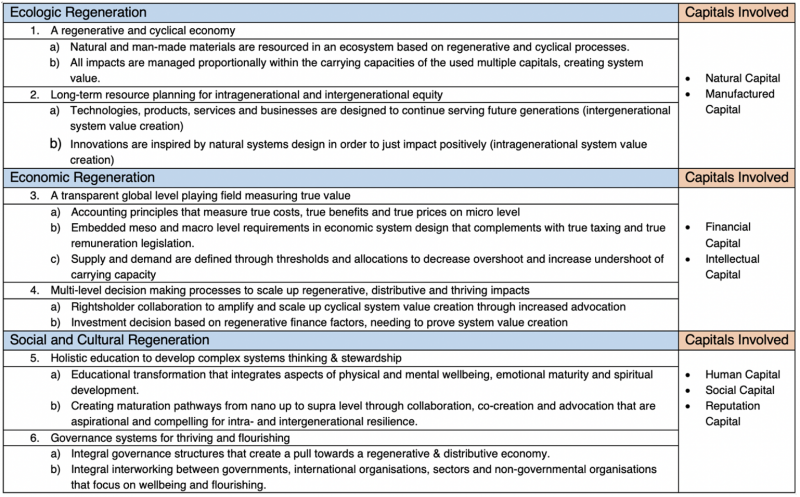From Monocapitalism to Multicapitalism
- Whitepaper: From Monocapitalism to Multicapitalism: 21st Century System Value Creation. By Bill Baue. R3.0, 2020
Introduction
1. Michel Bauwens
Why I endorse this approach, i.e. Multicapitalism is a vital ingredient of Post-Capitalism:
The multi-capitalist approach, which must not be mis-understood as 'pricing nature':
"It is true that multicapitalism is still beholden to the human vs nature dichotomy, BUT, I would argue that this will always remain a operative distinction even in a ecological world, as our distinct species interest do not fully coincide with the interests of all other species, despite our common interdependence on the web of line. To argue somewhat starkly: even breatharians would ingest and digest 'natural beings'. What Baue and colleagues stress, is the non-fungibility of capitals, and capitals are not defined as dead nature, as under monocapitalism, but simply as any 'stock' that produces flows; under a multi-capital approach, any human entity must respect every form of capital and defend it and that includes defending its aliveness, for example a dead pasture cannot produce any flow, neither for humans neither for extra humans. So, under monocapitalism, dead capital is prioritized, under the Shared Value paradigm (conscious capitalism), dead capital is prioritized and acceptable as long as other capitals may benefit also, and this approach is based on the fungibility and pricing of all capitals (so one can compensate the other) ,
HOWEVER, under multi-capitalism, System Value is prioritized, meaning that every of the 3 main capitals needs to be maintained and sustained. I see this as an important way to transform predatory entities into regenerative entities, and precisely because the language is rooted in our post-Enlightenment history, it has substantial chances to be adopted."
2. Lois Guthrie:
"In the introduction Bill asks whether capitalism as currently practiced, that is, with a focus on financial growth (monocapitalism) at the expense of other capitals, is the root cause of humanity’s predicament. As an alternative, Bill’s paper explores multicapitalism that “maintains the carrying capacities of all vital capitals respecting normative thresholds…that distinguish healthy capital resource stocks, which can continue to generate healthy flows, from unhealthy stocks, too compromised to produce healthy flows.” The paper therefore calls for a paradigm shift from Monocapitalism to Multicapitalism." (https://r3dot0.medium.com/who-knows-where-the-wisdom-goes-7c6ede00ad37)
Summary
Excerpted from the Executive Summary, by Bill Baue:
"The paradigm shift from Monocapitalism to Multicapitalism is necessary, inevitable, and already well underway. This White Paper lays out the fatal flaws of the existing Monocapitalism paradigm, then outlines the historical, conceptual, and practical foundations of Multicapitalism in order to understand how this emerging paradigm not only resolves these fatal flaws, but also opens the door to creating sustainable, regenerative, and thriveable business models and economic systems."
This White Paper defines Monocapitalism and Multicapitalism as follows:
- Monocapitalism: capitalism designed to grow and concentrate one form of vital capital – financial capital – very often at the expense of the ongoing viability of other capitals;
- Multicapitalism: capitalism designed to maintain the carrying capacities of all vital capitals (natural, human, social, intellectual, constructed, and financial) respecting normative thresholds.
The promised progress of the Monocapitalist paradigm, predicated on Economic Growth Theory, actually
generates decapitalization, whereby increases in one capital (financial) come at a cost to other capitals
(natural, human, social, intellectual, and constructed), resulting in overall devaluation that not only destroys System Value, but also aggregates to create systemic risks – and ultimately existential risks.
After identifying the shortcomings of Monocapitalism (its sole focus on financial capital, and its “irrationally exuberant” fixation on economic growth and concentration, primarily through privatization), this White Paper lays out the case for Multicapitalism. The promise embedded in the emerging Multicapitalist paradigm rests on its transformative nature: in addition to its comprehensive scope (across all six capitals), Multicapitalism also calls for respecting the carrying capacities of the capitals as a means of creating System Value – or value that accrues in dynamic balance across all capitals, and the systems associated with them.
In other words, Multicapitalism does not seek to continual growth of any single capital, but rather seeks to dynamically balance all capitals, as measured with respect to their carrying capacities. The seminal 1972 Club of Rome Limits to Growth report brought into our collective consciousness the concept of carrying capacity, which distinguishes sustainable and regenerative systems on the one hand, from unsustainable systems that trigger overshoot-and-collapse dynamics on the other hand.17 The carrying capacity concept applies to both ecological and social sustainability thresholds, which can be allocated to the sub-system levels – such as the company, portfolio, or national level – hence the notion of thresholds and allocations.
The carrying capacities of the capitals can be measured and assessed by applying the Sustainability Quotient, which holds that S=A/N, or Sustainability = Actual Impacts (on the carrying capacities of the capitals) / Normative Impacts (on the carrying capacities of the capitals).19 Attempts to transcend Monocapitalism have been hampered by focusing only on the numerator, seeking incremental improvements on actual impacts; actualizing Multicapitalism requires adding the normative denominator to guide these actual impacts into the “Safe and Just Operating Space” of bona fide sustainability.
After a Survey of Existing Initiatives that address
- the multiple capitals,
- carrying capacity thresholds, and
- the carrying capacities of the capitals,
this White Paper provides Case Studies of Multicapitalism applied at three levels of scale."
Visualisations
Source: The Big Sustainability Illusion
"to-do-list that data & information needs to contribute to:"

More information
- OnCommons gGmbh/ r3.0
Alexanderstrasse 7, 10178
Berlin, Germany - Support: hello@r3-0.org